

Serrate
The mill took water from the Barranco de la Torcida.
Pictures: 9.XI.2004
| Path: Introduction - Visit the mills; catalogue - Serrate |  |
Nederlands | ||||
 |
Mills in Altoaragón
Serrate |
|||||
| Serrate is situated at the
base of the Turbón mountain. From Campo (between Graus and Benasque) take the
road towards the spa of Vilas de Turbón. You'll pass Aguascaldas
(it means hot waters - several mineral waters are tapped from the Turbón), conquer some
hairpins and then reach Egea. About two kilometers past Egea you'll find
a small road to the right, to the casas de Piniello. The branch leading into Serrate
is a few hunderd meters further on to the left. But we drop the car at Piniello.
Walk to the end of the road and then down the slope which tends to be rather steep at
places. Then walk to the left along the water. You'll soon come across the ruins.
The mill took water from the Barranco de la Torcida. Pictures: 9.XI.2004 |
||||||
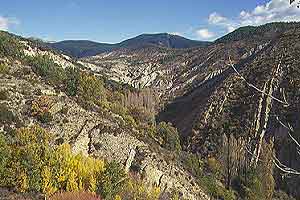 |
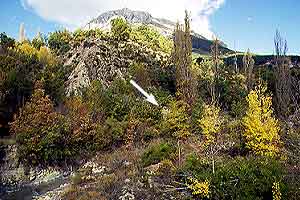 |
||
| (1) View from the casas de Piniello The mill is near the poplars bottom right |
(2) The mill hidden in the Barranco de la Torcida |
||
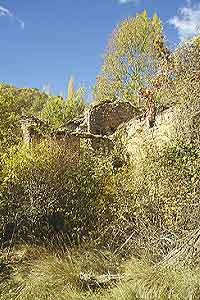 |
Most, if not all, maps of the region
feature this mill. This is rather peculiar because the construction is very ruinous and
not that easily reached and is not a highly visible landmark either.
As far as I can conclude from the remaining walls, the construction counted two sections: 1) living quarters which took the mayor part of the building and 2) the workplace of the mill which occupied about half of one plant. The house counted probably three inhabitable storeys, the mill only two, the lowest level taken by the cárcavo. The nicest of the remaining walls coincidently is the front wall of the mill. It took me several hours to cut the abundance of green and thorns away, but the results where worth every scratch. The facade features two lovely windows and a very nice arched outlet of the cárcavo. |
|
| (3) Huge construction; mill proper is at right. |
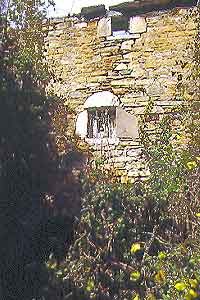 |
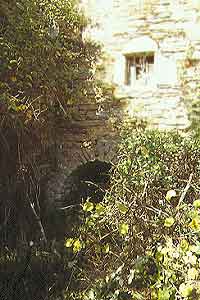 |
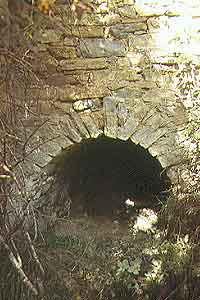 |
| (4) Front wall of the mill | (5) Outlet partly made free | (6) Nice arch gives access to the cárcavo. |
| We were able to enter the cárcavo (7) and found there a wooden axle (still in good shape) and a wheel fallen apart. Take a look at the upper mill of Javierre de Olsón to appreciate how the paddle fits in the wheel. | The mill is built against the hillside. The embalse (9) lies against the side wall of the mill and at the level of the roof (perhaps even a bit higher). I'm not sure how the water was canalized towards the saetín. There must have been a bend somewhere, but we couldn't find out. |
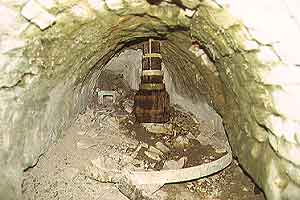 |
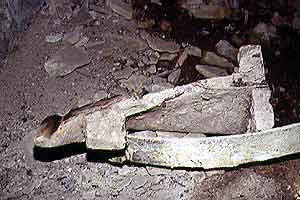 |
||
| (7) Cárcavo with wooden axle (arbol); nozzle (saetín) at the back left corner. |
(8) One of the wooden paddles; notice the peculiar shape. |
||
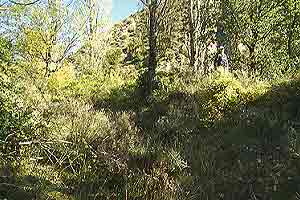 |
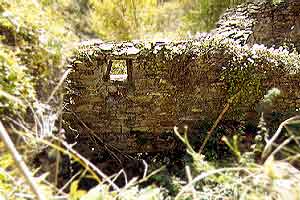 |
||
| (9) The water reservoir is situated at the same level as the roof. |
(10) The window is the top window in pict. 4 | ||
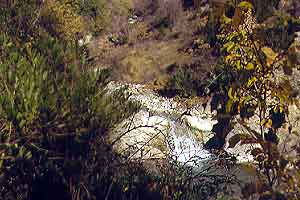 |
Round the corner and try to
find a spot where you can climb the hill. You'll soon reach the walls of
the reservoir. They are made of nicely stacked stones (9) and earth. The dimensions of
the reservoir are quite impressive. We could find no trace of any extension of
the embalse behind the back wall of the mill.
It was not possible to trace more than the first few meters of the supply channel. I'm therefore not entirely sure about the right spot of the intake (11). |
||
| (11) May be the point where the water was captured. | |||
|
Introduction Learn about the parts of a mill Visit the mills; catalogue Read more about mills © and e-mail: |
||
Path: Home / Altoaragón: old watermills |